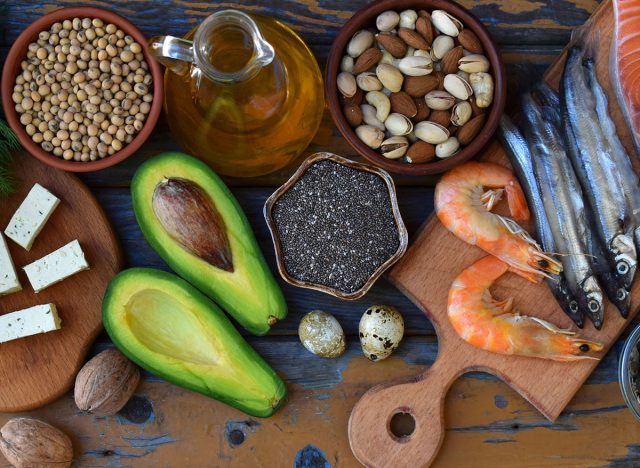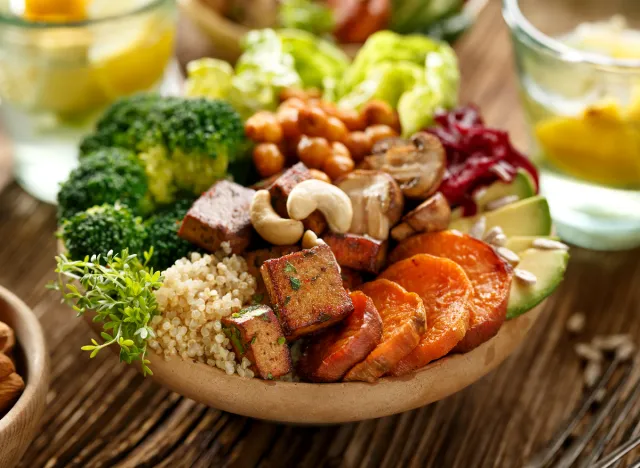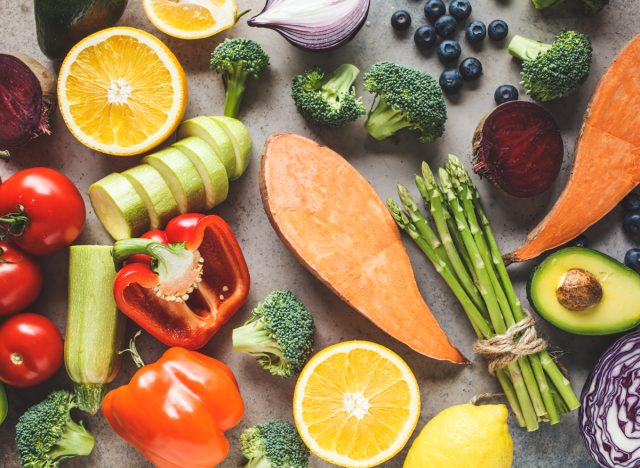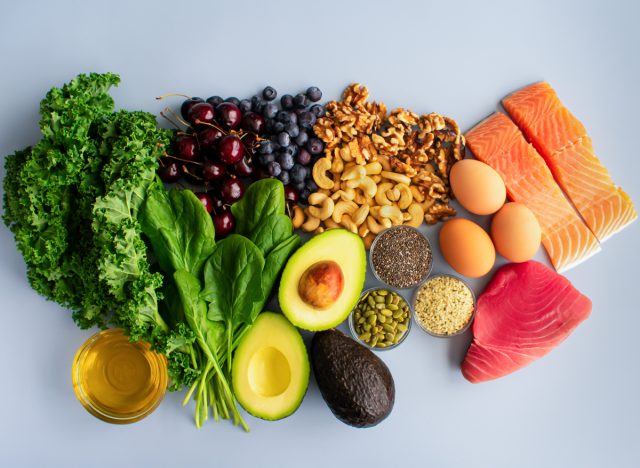6 Eating Habits That Slow Down Aging After 50

Aging is inevitable, and despite the fact that companies will try to market products that "stop" or "reverse" aging, there is no real way to do this. Thankfully, however, we can make changes to our diet and lifestyle that will still have a lasting effect on the rate at which we age and how healthy we can be in the process, and there are even certain eating habits we can adopt that can help us slow aging by reducing the risk of disease.
Focusing on age-related disease risk reduction is important at any age, but there are a few key reasons why your 50s is an important decade for adopting healthy eating habits. In general, aging is known as a major risk factor for disease. Additionally, the Mayo Clinic asserts that the likelihood of heart disease and heart attack can increase for men after turning 45 and for women after age 55. The National Institute of Aging also states that keeping your blood pressure levels at a healthy number in your 50s can directly impact your risk of heart disease. Furthermore, a study published in BMJ found that having a healthy heart in your 50s may help reduce your risk of dementia in later years.
As you can see, focusing on your risk of disease is a significant part of slowing the aging process in your 50s, and the good news is that maintaining healthy eating habits is a great way to do this. To find out which eating habits may be helpful in slowing aging after 50, we looked at recent research studies and talked with registered dietitian Trista Best, MPH, RD, LD, at Balance One Supplements. Read on to find out which eating habits she suggests—and for more healthy aging tips, make sure to check out 6 Foods Proven To Slow Down the Aging Process at Any Age.
Getting enough fiber

Getting enough dietary fiber in your daily diet as you age is crucial, as it can help lower your risk of heart disease, type 2 diabetes, high blood pressure, and even cancer, according to the American Journal of Lifestyle Medicine. Fiber can have this impact by way of lowering oxidative stress and inflammatory markers in the body—both of which are markers that occur naturally as you age.
In fact, a study published in The Journals of Gerontology found that after taking into consideration multiple factors like carbohydrate intake, sugar intake, glycemic load, and intake of fiber, it was fiber that made the most significant impact in ensuring successful aging and reduction of age-related disease risk.
To get more fiber in your diet, try incorporating more whole grains, lentils, vegetables, and fruit into your daily meals.
Eating plenty of protein

According to Current Opinion in Clinical Nutrition and Metabolic Care, your body begins to lose muscle mass every decade after the age of 30, with an even greater decrease occurring after the age of 60. To help fight age-related muscle loss, as well as prepare for your 60s by instilling helpful habits now, it's especially important to focus on building more muscle after the age of 50. One major way of doing this is by making sure you're eating enough protein.
A report published in Nutrients states that a diet high in protein combined with resistance training is helpful in maintaining healthy muscle growth as you age, and that the protein requirement is greater with age because of potential muscle mass loss. To get more protein in your diet, focus on lean sources like poultry, eggs, nuts, Greek yogurt, etc.
Incorporating healthy fats

As mentioned above, your risk for heart disease can increase as early as between the ages of 45 and 55. That said, a helpful area to focus on in your 50s is making sure you have a healthy heart. One major way to do this is by incorporating healthy fats like omega-3 fatty acids into your daily diet.
According to the Journal of the American Heart Association, taking omega-3 supplements can help lower the risk of coronary heart disease, and another report states that omega-3 fatty acids—like those found in fish, nuts, avocados, and certain plant oils—can help lower the risk of death from coronary heart disease as all as lower risk of hypertension.
If you can, try adding more foods with omega-3s into your diet, like fish, avocado, or nuts. If these foods don't appeal to your or you have trouble eating enough of them, you can always supplement with omega-3 pills.
Eating more plant-based foods

Incorporating more of a plant-based diet into your daily life has been shown to slow the aging process in a number of ways, as well.
"The benefits of a plant-based diet include increased longevity, reducing inflammation, helping with weight loss, lowering lipid levels, stabilizing blood pressure, and helping to reduce the number of advanced glycation end products (AGEs)," says Best.
According to Best, these AGE compounds, which are found in many processed foods and animal products like processed red meat (think: bacon and sausages) are often associated with heart disease, obesity, diabetes, and hypertension.
"Not only do they age a person internally, but externally as well by causing oxidative damage to the skin, which can lead to wrinkles and fine lines," says Best.
Research proves this to be true about plant-based diets, with a study published in PLoS Medicine finding that diets high in plant-based foods can help increase lifespan. Another study published in the Journal of Clinical and Aesthetic Dermatology found that plant-based diets can play a role in slowing down skin aging.
Avoiding ultra-processed foods

Whole foods include anything that is in its "natural" form without a lot of processing done to it. This includes vegetables, fruits, non-processed animal products, whole grains, beans, legumes, and nuts. Ultra-processed foods, in contrast, have undergone a lot of processing and are often higher in sugar, saturated fat, calories, sodium, and additives. To help slow aging after 50, Best suggests limiting your intake of ultra-processed foods and eating more whole foods.
"Eating whole foods means you aren't eating as many processed foods, which significantly reduces the number of advanced glycation end products (AGEs) that are consumed, as well as lowers your consumption of inflammatory refined carbohydrates," says Best.
In fact, ultra-processed foods specifically have been found to have an impact on your heart health, with one study from Advances in Nutrition concluding that a diet high in this type of food can increase your risk of heart disease—something that already increases when you're in your 50s. To help fight this potential increase, incorporate more whole foods and fewer ultra-processed ones.
Following the Mediterranean diet

And finally, eating similarly to the traditional Mediterranean diet can help slow your aging process by integrating healthier fats and lowering your intake of ultra-processed foods.
"While the Mediterranean diet focuses primarily on fish and seafood as the source of protein, it does allow for red meat as well," says Best, "and its integration of healthy fats gives you a larger amount of omega-3 fatty acids, which are naturally anti-inflammatory and aid in healthy aging."
As you can see, many of these eating habits are centered around lowering your intake of inflammatory, AGE-heavy foods like processed foods and refined carbohydrates, while incorporating plenty of vegetables, whole grains, fruit, protein, and fiber.
A previous version of this story was published on November 7, 2021. It has been updated to include additional copy and proofreading revisions, additional research, and updated contextual links.
- Source: https://www.sciencedirect.com/science/article/pii/S0960982212008159
- Source: https://www.mayoclinic.org/diseases-conditions/heart-attack/symptoms-causes/syc-20373106
- Source: https://www.nia.nih.gov/health/high-blood-pressure-and-older-adults
- Source: https://www.bmj.com/content/366/bmj.l4414
- Source: https://www.ncbi.nlm.nih.gov/pmc/articles/PMC6124841/
- Source: https://link.springer.com/chapter/10.1007/978-981-15-3552-9_6
- Source: https://academic.oup.com/biomedgerontology/article/71/10/1335/2198172
- Source: https://journals.lww.com/co-clinicalnutrition/Abstract/2004/07000/Muscle_tissue_changes_with_aging.9.aspx
- Source: https://www.ncbi.nlm.nih.gov/pmc/articles/PMC6073774/
- Source: https://www.ahajournals.org/doi/10.1161/JAHA.119.013543
- Source: https://pubmed.ncbi.nlm.nih.gov/25720716/
- Source: https://www.ncbi.nlm.nih.gov/pmc/articles/PMC6600625/#:~:text=Origin%20and%20Metabolism-,Advanced%20glycation%20end%20products%20(AGEs)%20are%20a%20family%20of%20compounds,%2C%20lipids%2C%20or%20nucleic%20acids.&text=Roasting%20and%20broiling%20food%20at,a%20common%20practice%20in%20cooking.
- Source: https://journals.plos.org/plosmedicine/article?id=10.1371/journal.pmed.1003889
- Source: https://www.ncbi.nlm.nih.gov/pmc/articles/PMC7380694/
- Source: https://www.sciencedirect.com/science/article/pii/S2161831322004628?via%3Dihub









